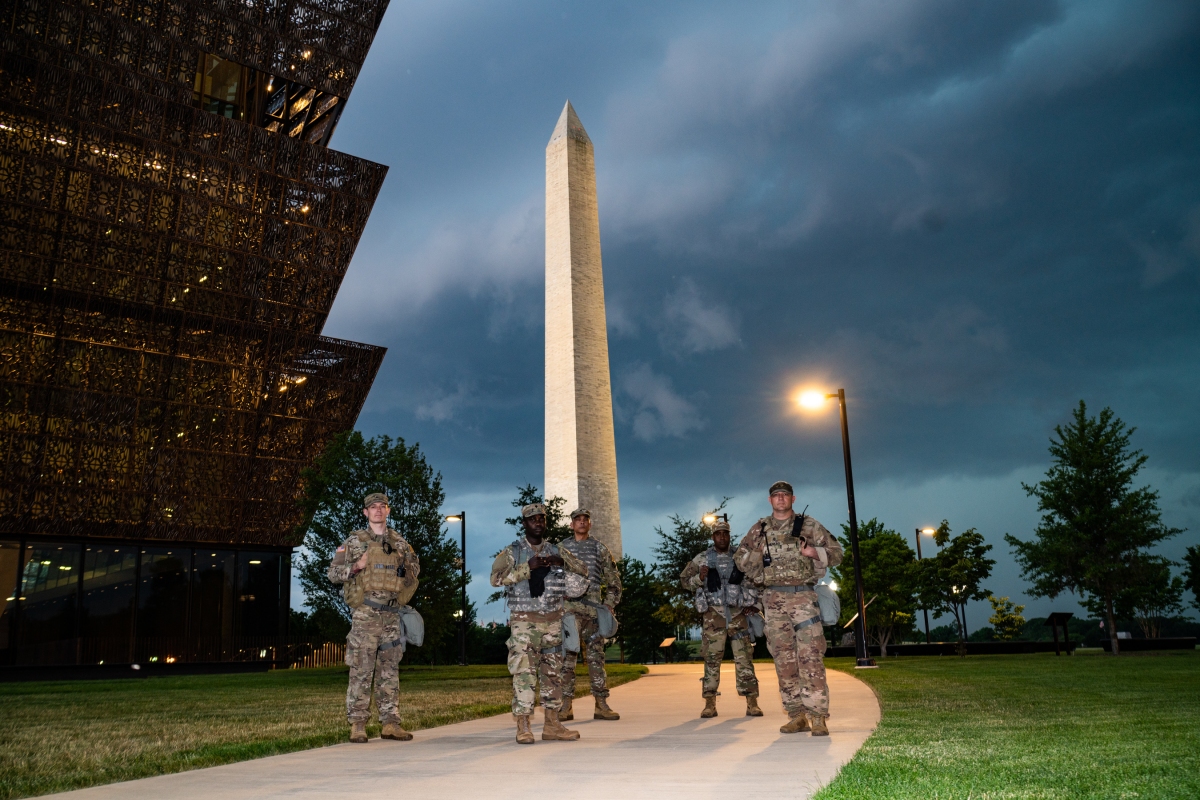ANNAPOLIS (October 16, 2020)—The Maryland National Guard briefed state lawmakers Wednesday on Gov. Larry Hogan's June deployment of troops to the nation's capital during the civil unrest ignited by the death of George Floyd.
Brig. Gen. Adam Flasch said during a virtual meeting with members of the Joint Committee on Federal Relations that the Maryland Guard's five-day mission to protect national monuments in Washington, D.C., was "successful" and that interactions with civilians in the capital were "largely positive."
The federal government paid $546,360 to have 116 Maryland Guard troops stationed around three monuments—the Lincoln Memorial Reflecting Pool, the World War II Memorial and the Washington Monument—from June 2 through June 6, Flasch said. The state of Maryland incurred no costs.
Protesters nationwide condemned police treatment of Black and Brown people after a video of a traumatic, fatal police encounter with Floyd went viral. The video showed a Minneapolis police officer kneeling on the 46-year-old's neck for several minutes.
The troops were there to support the District of Columbia National Guard and the United States Park Police, Flasch said. He said the troops were deployed under a federal law used every four years to deploy state troops during presidential inaugurations.
A spokesman for the Maryland National Guard wrote in an email that troops were involuntarily subscribed for the mission, were unarmed and there were no injuries sustained by guard members.
Flasch delivered responses also found in a Sept. 8 letter from the Maryland Guard's Adjutant General Timothy E. Gowen to the joint committee, outlining the laws governing the use of the troops, associated costs and mission scope.
Joint committee Chair Sen. Jill Carter, D-Baltimore, said prior to the briefing that even though Gowen's letter satisfied her questions, she still had concerns.
"My personal concern was, of course, the potential use of our National Guard to pose restrictions on protesters, or possibly engage in any type of use of force against the citizens," Carter said.
Joint committee Co-chair Delegate Al Carr, D-Montgomery, asked Flasch why Maryland sent troops when other states, like Virigina, declined.
"Do you think there's a potential for the public to perceive a deployment like this as being politicized, when only certain states are sending their guardsmen and other states are not?" Carr said.
Flasch said it was not for him to comment on public perception but that troops "followed our standard operating procedures and mission analysis, and did our best to support the D.C. National Guard in their mission assignments."
Committee member Sen. Mary Beth Carozza, R-Somerset, Wicomico and Worcester, said she was grateful the Maryland National Guard supported the efforts to protect national monuments. Carozza noted that the Guard also assists other states during declared emergencies, such as hurricanes, and these missions are authorized under federal legal authority.
Hogan, R, as Commander-in-Chief of the Maryland National Guard, can deploy troops within the state, to assist other states, or in cooperation with the federal government.
Although the president can federalize the National Guard under the Insurrection Act, the letter from Gowen, outlining the response to a request from the U.S. Secretary of Defense to the governor, said the legal framework under which troops were deployed required the governor's approval.
U.S. Secretary of Defense Mark Esper in June asked Hogan to deploy the state's national guard forces to D.C. "to protect federal facilities and enclaves," according to the Guard's response letter.
Gowen wrote, troops, "would not be used for civil disturbance response in the District of Columbia, and their primary mission was to provide security and monitoring to federal monuments only" and that "mission parameters were fully complied with by the Commander of the (D.C. National Guard) throughout the duration of the mission."
"The (Maryland National Guard) sustained positive interactions with the citizens in and around their area of responsibilities. There were no unlawful acts and the mission to keep monuments from being damaged was successful," according to the slide presentation," Gowen wrote in the letter.
A spokeswoman for the governor's office said "the mission to protect the national monuments was coordinated by the leadership of the Maryland and D.C. National Guards, which work together on a regular basis."
Carter speculated prior to the briefing that the committee would be discussing the matter further.
"I definitely believe that following this briefing, one of the issues our committee will discuss is whether there should be some checks and balances by the legislature on the governor's authority," she said.
Md. National Guard at D.C. monuments 5 days during protests

More than 100 Soldiers from the Maryland Army National Guard provided a nightly security presence over historical landmarks along the National Mall at night in response to civil unrest in Washington D.C. on June 6, 2020. (U.S. Army National Guard Photo by Sgt. 1st Class Thaddeus Harrington)


